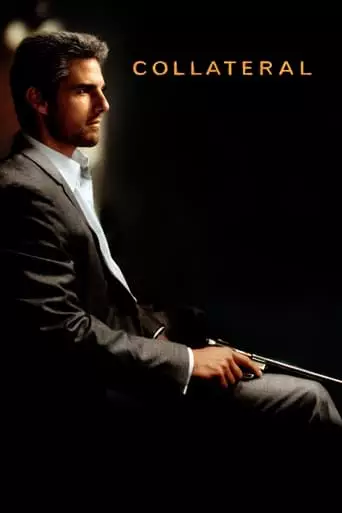Cab driver Max picks up a man who offers him $600 to drive him around. But the promise of easy money sours when Max realizes his fare is an assassin.
Collateral, directed by Michael Mann, is a neo-noir action thriller that follows the tense, chaotic events of a single night in Los Angeles. Max (Jamie Foxx), a mild-mannered taxi driver, picks up Vincent (Tom Cruise), a charming yet ruthless hitman, who hires him for a night of driving across the city. Vincent, who is on a mission to eliminate five targets, forces Max to become an unwilling accomplice as he moves from one location to the next, leaving a trail of violence and destruction. As the night progresses, Max is forced to confront his own fears and beliefs about his life and his future, while Vincent reveals his deeper psychological motivations.
The film takes place within a compressed timeframe, allowing its themes of fate, morality, and existentialism to unfold in real-time. Max, initially passive and seemingly content with his mundane life, is gradually forced to reassess his choices and actions, while Vincent’s cold, calculated nature offers a chilling contrast. The interplay between the two characters creates a narrative of intense philosophical and moral tension.
Themes of Collateral
- Fate and Existentialism: A key theme explored in Collateral is the randomness of fate. Max’s life is thrown into chaos by his encounter with Vincent, challenging his preconceived notions of control and destiny. The film probes the existential idea that life is unpredictable and that individuals often have little power over their circumstances, reflected in Vincent’s cold view of the world.
- Morality and Choice: The film examines the moral dilemmas of its characters, particularly Max, who is forced into a situation where his personal ethics and survival instincts clash. Through Vincent’s actions and philosophical musings, Collateral invites viewers to question the nature of good and evil.
- Loneliness and Human Connection: Despite its action-packed plot, Collateral also explores themes of isolation and the human desire for connection. Max’s lonely existence contrasts with Vincent’s detached professional persona, making their interactions a study of two very different men who, in some ways, share a common sense of disconnection from the world around them.
- The Duality of Human Nature: Vincent’s character embodies duality—he is both a cold-blooded killer and a reflective, even philosophical, individual. This complexity is mirrored in the film’s portrayal of Max, who, while outwardly simple and unassuming, harbors the potential for greater action and decision-making.
10 Reasons to Watch Collateral
- Strong Performances: Tom Cruise delivers one of his most compelling performances as Vincent, a hitman who is as enigmatic as he is dangerous. Jamie Foxx, in contrast, presents a nuanced portrayal of Max, a man who is thrust into an unimaginable situation and must rise to meet it.
- Tense Atmosphere: The film creates a palpable sense of tension throughout, with its claustrophobic setting of a nightmarish, high-stakes taxi ride across the city. The pacing and mood reflect the urgency of the characters’ actions, keeping viewers on edge.
- Cinematic Direction: Michael Mann’s direction is masterful in creating a stylish, gripping thriller. His use of lighting, sound, and the nighttime setting of Los Angeles heightens the film’s noir elements.
- Unique Storytelling: The narrative is told in real time, which adds an element of suspense and realism to the unfolding drama. This format allows viewers to become more immersed in the characters’ emotional and physical journeys.
- Engaging Dialogue: The film is driven by sharp, insightful dialogue, particularly between Max and Vincent. Their conversations reveal deep existential themes and create a compelling dynamic between the two characters.
- Moral Complexity: The film doesn’t offer clear-cut heroes and villains. Instead, it challenges viewers to think critically about the choices and motivations of its characters, making it an intellectually engaging watch.
- Visual Appeal: The film’s use of Los Angeles as a backdrop provides an almost cinematic character of its own. The city’s nightscape adds to the film’s noir atmosphere, making the visuals a key part of the storytelling.
- Philosophical Depth: Collateral offers thought-provoking reflections on life, death, and the choices that define us. It invites viewers to ponder the deeper meaning of existence and morality.
- Unexpected Action: Though the film is primarily a character-driven drama, it also features thrilling action sequences that keep the pace fast and exciting without overwhelming the emotional undercurrents of the story.
- Tom Cruise’s Villainous Role: This is a rare role for Tom Cruise, who is known for playing the hero. His portrayal of Vincent as a calm but dangerous hitman shows his versatility as an actor and offers a fresh take on the villain archetype.
What Will You Feel After Watching Collateral?
After watching Collateral, you may experience a mix of feelings—introspection, tension, and a sense of unease. The film’s exploration of fate and existential crisis will likely leave you reflecting on your own life choices, the randomness of the universe, and the moral implications of decisions made under pressure. While Collateral is packed with thrilling action, it is the emotional depth and philosophical dialogue that will linger long after the credits roll. You might find yourself contemplating the nature of good and evil, the cost of a life lived without introspection, and the possibility of change, even in the darkest of circumstances. The intense atmosphere and the final confrontation will leave you breathless, but the film’s underlying themes will prompt deeper thoughts on personal responsibility and human connection.
Collateral offers more than just a typical thriller—it is a character-driven study that forces its audience to confront their assumptions about life and morality

